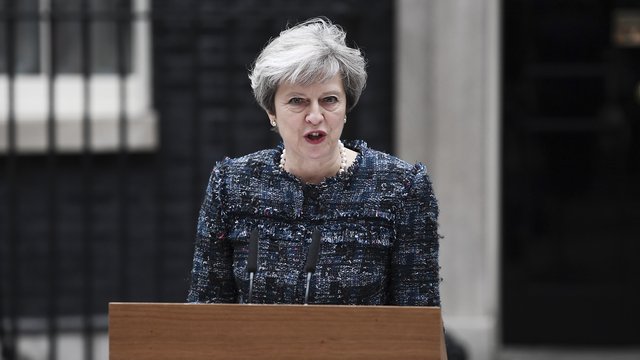May's Future Questioned
8 June 2017, 23:47

Broadcaster's exit poll suggested the UK is heading for a hung parliament, with Conservatives 12 seats short of the 326 they need for an absolute majority in the House of Commons.
The pound plummeted more than 1.5% against the US dollar and 1% against the euro as the shock figures set the scene for political turmoil at Westminster, disruption to upcoming Brexit negotiations and the possibility of a second election later in the year.
Former chancellor George Osborne said, if borne out by actual results, the ``catastrophic'' figures would put Mrs May's future as Conservative leader in doubt.
The Evening Standard editor, who was sacked from the Cabinet by Mrs May when she took office last July, told ITV: ``Clearly if she's got a worse result than two years ago and is almost unable to form a government then she, I doubt, will survive in the long term as Conservative party leader.''
Ukip leader Paul Nuttall said: ``If the exit poll is true then Theresa May has put Brexit in jeopardy. I said at the start this election was wrong. Hubris.''
Mr Nuttall's predecessor Nigel Farage also questioned Mrs May's position, saying: ``Whatever the true result, the Conservative party needs a leader that believes in Brexit.''
But senior figures from all parties urged caution on the poll findings, which put Tories on 314 seats, with Labour on 266, the Scottish National Party on 34, Liberal Democrats on 14, Plaid Cymru on three and Greens on one.
Tory Defence Secretary Sir Michael Fallon told the BBC: ``This is a projection, it's not a result. These exit polls have been wrong in the past.''
Labour's shadow chancellor John McDonnell also warned against reading too much into the prediction, saying: ``We have to have some scepticism about all polls at the moment.''
In private, Labour activists were jubilant.
One senior party source pointed out Mrs May had said repeatedly during the election campaign that if she lost six seats she would no longer be Prime Minister, adding: ``If this exit poll is correct, her credibility is completely shot.''
If borne out by the actual results, the poll figures would represent a humiliation for the Prime Minister, who went into the election with a small but viable majority and expectations she should be able to secure an advantage of 100 seats or more by going to the country three years ahead of the scheduled election in 2020.
It would be a personal triumph for Labour leader Jeremy Corbyn, who was widely regarded as having run a successful campaign after being written off as unelectable by many observers and some in his own party.
It would also amount to a significant setback for the SNP's Nicola Sturgeon, whose party won a historic 56 out of 59 seats north of the border just two years ago.
And it would throw the UK's politics into disarray as the parties scramble to form a government, just 11 days before the expected start of Brexit negotiations in Brussels.
The poll suggests the Tories would be down 17 seats on their result in the 2015 general election, while Labour gains 34, the SNP loses 22 and the Liberal Democrats gain six.
However, even after 30,000 voters were questioned at 144 polling stations, there is always a possibility that the exit polls may be misleading.
In 2015, they significantly underestimated the Tory tally, putting David Cameron's party on 316 when it finally emerged with 331.
The poll triggered instant speculation over the shape of any coalition if no party has an overall majority in the Commons.
Even with the support of Northern Ireland unionists, Conservatives would struggle to form a viable administration without reaching out to other parties.
Meanwhile, a so-called ``progressive alliance'' bringing together Labour, Liberal Democrats, the SNP, Plaid Cymru and Greens would fall short of an absolute majority and produce a total only a few seats larger than the Tories on their own.
The one combination which would creep over the crucial 326 mark would be a repeat of the 2010 Tory-Lib Dem coalition, which has been explicitly ruled out by Lib Dem leader Tim Farron.
Labour, Lib Dems and the SNP have ruled out a formal coalition, speaking instead about the possibility of a minority administration being propped up on a vote-by-vote basis.
A Labour spokesman said: ``If this poll turns out to be anywhere near accurate, it would be an extraordinary result.
``Labour would have come from a long way back to dash the hopes of a Tory landslide.
``There's never been such a turnaround in a course of a campaign. It looks like the Tories have been punished for taking the British people for granted.''
A Lib Dem source said it was ``too early'' to comment on the exit poll, but indicated the party did not have significant ambitions for gains: ``In this election holding our own is a good night.''
Green co-leader Caroline Lucas said she could ``hardly dare hope'' that the exit poll was right, adding: ``To be clear, Greens will never support a Tory government.''
Mr Osborne said it was ``difficult to see, if these numbers are right, how (Conservatives) would put together the coalition to remain in office.
``But equally it's quite difficult to see how Labour could put together a coalition.''
As results started to trickle in, Labour took the first two seats to declare, party strongholds Newcastle Central and Sunderland & Houghton South, increasing its share of the vote in each.






